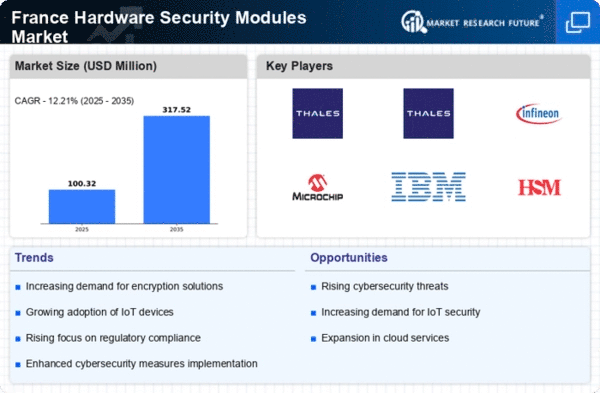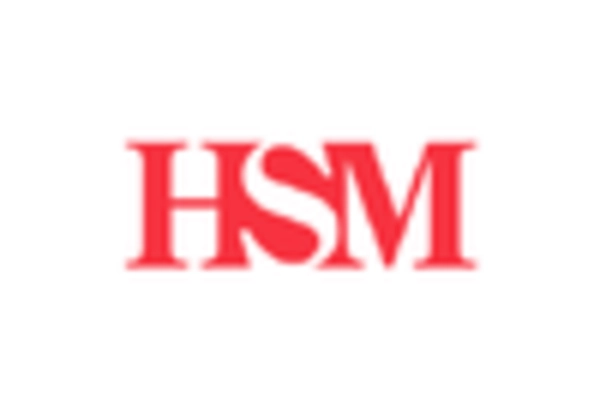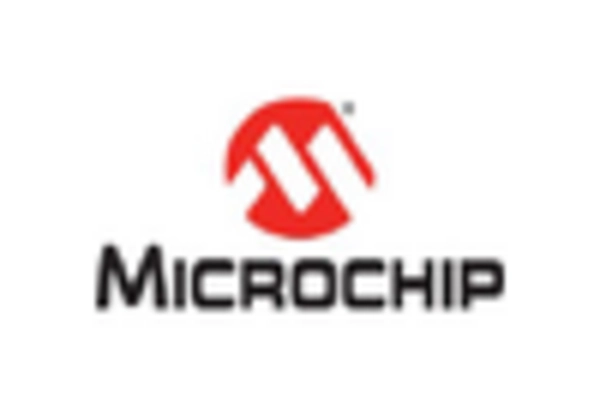Expansion of Cloud Services
The hardware security-modules market is significantly influenced by the rapid expansion of cloud services in France. As businesses increasingly migrate their operations to the cloud, the need for secure data management solutions becomes paramount. In 2025, the cloud services market is projected to reach €10 billion, with a substantial portion allocated to security solutions. Hardware security modules play a critical role in ensuring the security of cloud environments by providing encryption and secure key management. This trend indicates a growing reliance on hardware security modules to protect sensitive data stored in the cloud. As organizations seek to leverage the benefits of cloud computing while mitigating security risks, the hardware security-modules market is likely to witness accelerated growth, driven by the demand for integrated security solutions.
Emergence of Advanced Threats
The hardware security-modules market is increasingly shaped by the emergence of advanced cyber threats targeting organizations in France. As cybercriminals develop more sophisticated attack vectors, the need for enhanced security measures becomes evident. In 2025, it is projected that cyberattacks will cost businesses in France over €5 billion, underscoring the urgency for effective security solutions. Hardware security modules provide a formidable defense against these threats by offering secure cryptographic functions and protecting sensitive data from unauthorized access. This growing awareness of the potential risks associated with cyber threats is likely to drive organizations to invest in hardware security modules as a proactive measure. Consequently, the hardware security-modules market is expected to expand as businesses seek to fortify their defenses against evolving cyber risks.
Focus on Regulatory Compliance
The The proliferation of Internet of Things (IoT) devices is emerging as a key driver for the market. is significantly impacted by the increasing emphasis on regulatory compliance across various sectors. Organizations are compelled to adhere to stringent regulations that mandate the protection of sensitive data. In 2025, it is anticipated that compliance-related investments will account for over 20% of the total IT security budget for many enterprises. This trend drives the adoption of hardware security modules, which offer robust solutions for encryption and secure key management, essential for meeting compliance requirements. As businesses strive to avoid hefty fines and reputational damage associated with non-compliance, the hardware security-modules market is likely to experience sustained growth. The alignment of security strategies with regulatory frameworks will further solidify the role of hardware security modules in safeguarding critical data.
Rising Adoption of IoT Devices
The proliferation of Internet of Things (IoT) devices in France is emerging as a key driver for the hardware security-modules market. With an estimated 30 million IoT devices expected to be deployed by 2025, the need for secure communication and data integrity is becoming increasingly critical. Hardware security modules provide essential functionalities such as secure key storage and cryptographic operations, which are vital for protecting IoT ecosystems. As industries such as healthcare, manufacturing, and smart cities adopt IoT technologies, the hardware security-modules market is likely to benefit from the heightened focus on securing these interconnected devices. This trend suggests that the integration of hardware security modules into IoT solutions will be a significant factor in ensuring the security and reliability of IoT applications.
Increasing Demand for Data Protection
The The market in France is experiencing a notable surge in demand for robust data protection solutions. is experiencing a notable surge in demand for robust data protection solutions. As organizations increasingly recognize the importance of safeguarding sensitive information, the adoption of hardware security modules has become a strategic priority. In 2025, it is estimated that the market will grow by approximately 15%, driven by the need to comply with stringent data protection regulations such as GDPR. This regulatory landscape compels businesses to invest in advanced security measures, thereby propelling the hardware security-modules market forward. Furthermore, the rise in data breaches and cyber threats has heightened awareness among enterprises, leading to a proactive approach in securing their digital assets. Consequently, the hardware security-modules market is poised for substantial growth as organizations prioritize data integrity and confidentiality.
















